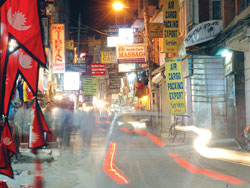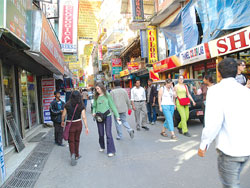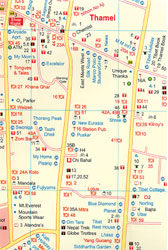 It is 10.30 PM in Thamel and things are heating up in the most entertaining and possibly the most dangerous, corner of Kathmandu. The latest Bollywood hits blare from dance bars competing with live bands playing rock n roll covers. The music adds to the cacophony of a traffic jam as irate drivers lean hard on horns.
It is 10.30 PM in Thamel and things are heating up in the most entertaining and possibly the most dangerous, corner of Kathmandu. The latest Bollywood hits blare from dance bars competing with live bands playing rock n roll covers. The music adds to the cacophony of a traffic jam as irate drivers lean hard on horns.The air smells of exhaust and food from hawkers selling momos, chiya and bread omelettes. Drug dealers, some from as far away as Africa, peddle their wares: "Hash, you want marijuana, pot?" Transvestites and eunuchs flirt with groups of Nepali men looking for a cheap thrill. Street children try to make eye contact with customers spilling out of restaurants.
Just 50 years ago, this hot spot was the back of beyond. "No one wanted to come here," recalls long-time Thamel resident Rajendra Man Sherchan, "it was so isolated that people were scared to go out at night and it was very dirty too-we had to roll up our trousers to keep them clean while walking."
 The golden years began in 1967 when Karna Shakya took an old Rana palace and turned it into Kathmandu Guest House. With the drop in popularity of Freak Street among tourists on the Hippie Trail because of frequent police raids to curb drugs and lawlessness, news spread by word of mouth of a wholesome place for backbackers.
The golden years began in 1967 when Karna Shakya took an old Rana palace and turned it into Kathmandu Guest House. With the drop in popularity of Freak Street among tourists on the Hippie Trail because of frequent police raids to curb drugs and lawlessness, news spread by word of mouth of a wholesome place for backbackers.Those in search of nirvana found that Thamel was closer to the Swayambunath Stupa than Jocche. Those in search of the next big high were delighted to find cheap cannabis from Nuwakot and Dhading. House owners along the filthy alleys of Bhagwan Bahal, Chakshibari and Paknajol recognised the opportunity and slowly started converting their properties into guest houses, restaurants and pubs.
The 1980s saw a different kind of tourist arriving. RNAC and other major carriers were connecting Kathmandu to the world. New trekking and rafting routes were being opened and the exchange rate meant that the exotic Shangri-la experience could be a relatively cheap vacation. Thamel was often a tourists' first point of contact with Nepal and by then it had cleaned up enough to serve as a cultural buffer between the East and the West.
 For Nepalis quick to identify a good thing coming, land prices were still affordable and rent even cheaper. Single-room travel agencies, trekking and rafting operators popped up to fill the gap between the do-it-yourselfers and the ritzy agents in Darbar Marg. "That was the best time," remembers Sunil Shrestha, who has been a travel agent, restaurateur and today manages a cyber cafe. "Those days it seemed like everyone wanted to come to Thamel. We were, well at least I was, minting money."
For Nepalis quick to identify a good thing coming, land prices were still affordable and rent even cheaper. Single-room travel agencies, trekking and rafting operators popped up to fill the gap between the do-it-yourselfers and the ritzy agents in Darbar Marg. "That was the best time," remembers Sunil Shrestha, who has been a travel agent, restaurateur and today manages a cyber cafe. "Those days it seemed like everyone wanted to come to Thamel. We were, well at least I was, minting money." It seemed simple enough to let the area grow but unchecked growth can be disastrous. Today, there are almost 500 lodges and guest houses, nearly double that number of restaurants, bars, shops and agencies crammed into the Thamel area. With land now at a premium, there is only one way to grow skywards and buildings are violating seismic safety standards.
Traffic frequently grinds to a standstill because the narrow alleys were never designed to squeeze a dump truck past a police van on a one-way street. There are potholes that could swallow a whole car. "We contribute to the economy and we pay our taxes so the least the authorities can do is repair the roads and provide better security," says Pemba Ghale who runs a dance restaurant. He, like all business owners in Thamel, also shells out hefty monthly 'protection fees' to the various quarters that demand it.
Dark shadows loom in the neon lights of Thamel. The road into Thamel becomes a meat market every night. The legalisation of prostitution is a hot potato that no one wants to touch and so sex workers put themselves at risk with each encounter. This could well be the biggest breeding ground for AIDS, despite the sight of discarded condoms that litter the narrow side alleys. Long-time Thamel resident, Kiran Adhikary, 31, says, "It was once cool to live here but now it's both embarrassing and scary. I'd get the hell out if I could!"
The downturn in tourism has busted many businesses. Lodge owners wait for walk-in guests after bookings are cancelled at the last minute because of embassy advisories. Shopkeepers still open their shutters and dust their goods and travel agents prop up boards advertising the next budget trek.
In some ways Thamel is a good metaphor for the nation-while lawlessness, economic desperation and uncertainty prevail, it is not too late to turn things around. Thamel just needs to learn from places and people doing it right. Lake Side in Pokhara is a good enough example. Pokhara Tourism organises events to engage foreign and domestic tourists, Pokhrelis take pride in their lake and despite temptations, controls have been placed on development of this most lucrative strip of real estate.
Ganesh Bhattarai of Pokhara Tourism knows what the problem with Thamel is: "Everybody is just waiting for the guy next door to take that first step. Well, it's not going to work that way."
The Nepal Tourism Board, the Thamel Tourism Development Board, HAN, REBAN, NATA, NARA and all others involved must now assess Thamel's state in order to start planning its future. Sherchan sums it up with cautious optimism: "It has an identity of its own and as long as budget tourism is around, this place will be around. Thamel won't die."


